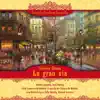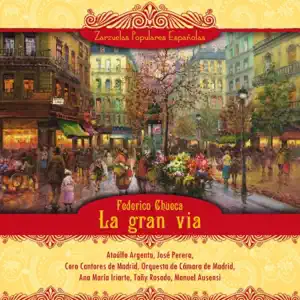


About Federico Chueca
Arrested during the St. Daniel's Night uprising that swept through Madrid in 1865, Federico Chueca was in jail when he wrote the waltz, "A Prisoner's Lament. Orchestrated by Francisco Asenjo-Barbieri, who changed the title to "Cupid And Esculapius, the tune became a springboard for Chueca's subsequent success. Three years later, he composed a hymn for General Prim, "March From Cadiz", that was later adopted as a quasi-national anthem for the Spanish military. Music provided a consistent theme throughout Chueca's life. Enrolling at the Madrid Conservatory, at the age of eight, he built his early reputation on his inventive piano pieces. A career as a musician, however, was not considered as Chueca elected to study medicine at San Carlos. Chueca's dreams of becoming a doctor faded with the passing of his parents, from cholera, in 1867. Leaving school, he devoted his attention to music, re-enrolling in the music conservatory and accepting a position as a pianist at Café de Zaragoza. Staking his claim for stardom as composer of "Cupid And Esculapius and March To Cadiz, Chueca advanced quickly. Hired as conductor of Teatro de Variedades, in 1874, he remained with the group until 1885, when he became conductor of Teatro Apolo.nnMany of Chueca's best remembered tunes, including "Los Barrios Bajos", "La Cancion De La Lola", "Fiesta National", "Cadiz" and "El Ano Pasado Por Aqua", were written with Joaquin Valverde, a lyricist he met in 1875. They scored a massive hit with the 1886 tune, "La Gran Via", which combined elements of polka, waltz, tango, mazurka and schottische. A master at composing scores for such Spanish operetta-like zarzuelas as El Chaleco Blanco, Las Zapatillas and La Alegria De La Huerta, Chueca experienced his last success with the score of El Batei in 1901.nnChueca succumbed to complications of diabetes on June 20, 1908.
About us
• What is CANCIONEROS.COM/LYRICS
• Contact us
• How to collaborate
Notes


